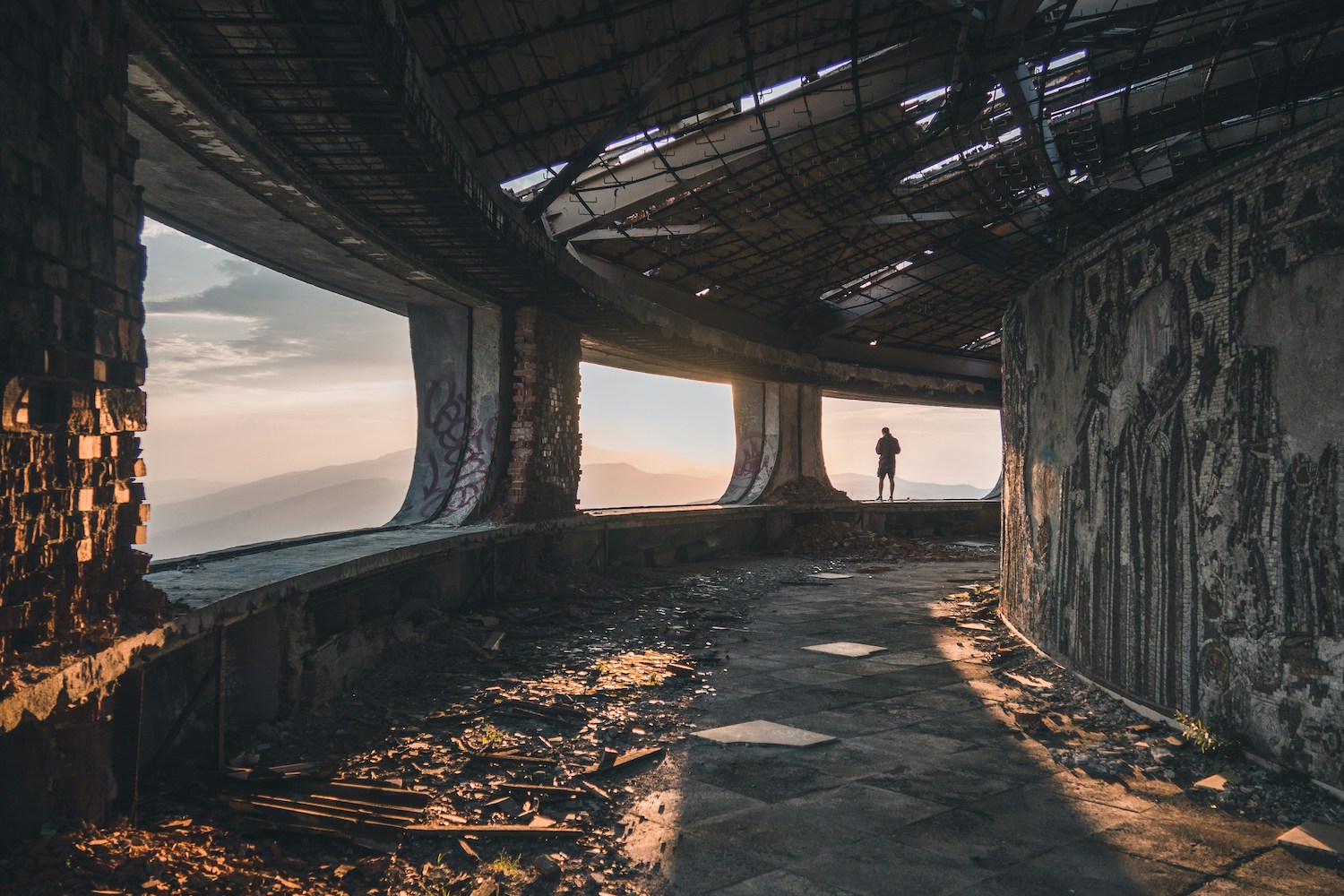It’s pretty common for monsters or other SFF antagonists to be the cause of the end of the world in fiction—be they zombies, vampires, aliens, or robots. On the other hand, there are other world-ending catastrophes that instead leave the Earth nearly empty—think highly fatal diseases and environmental disasters. With no monsters running rampant and human civilization left in tatters, the few survivors are left to wander a basically vacant world. But fear not, a lack of monsters doesn’t mean a lack of tension, and these post-apocalyptic stories really shine in crafting an eerie atmosphere. Here are five examples, ranging from harrowing tales of survival to a sweet story of budding romance.
I Who Have Never Known Men (1995) by Jacqueline Harpman (translated by Ros Schwartz)
Originally published in French, I Who Have Never Known Men is a fairly short book, but it packs a lot into its pages. Our unnamed narrator is locked in an underground cage with thirty-nine other women. She’s the youngest captive and doesn’t have any memory of life before the bars, and her fellow inmates are reluctant to speak of the world as it once was. As strange as their caged existence is—they struggle to make sense of the various rules and routines imposed on them by the male guards—things are just as bizarre above ground.
Jacqueline Harpman’s stark prose perfectly matches the desolate world in which these women live. But even though themes of isolation and confusion loom large in the narrative, it’s just as much about hope, community, and purpose. While it’s not uncommon for post-apocalyptic stories to withhold information about what exactly caused the world to end, I Who Have Never Known Men takes this to the extreme by continually leaving its characters—and, by extension, its readers—in the dark. Some people may find the lack of answers frustrating, but I think that’s kind of the point.
A Boy and His Dog at the End of the World (2019) by C.A. Fletcher
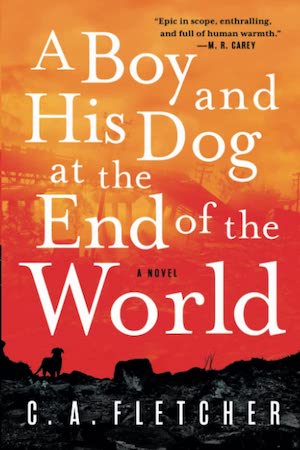
It’s no secret that I’m a sucker for post-apocalyptic stories featuring canine characters and A Boy and His Dog at the End of the World offers up two such good dogs: Jess and Jip. These faithful hounds are the companions (pets doesn’t feel like the right word!) of Griz, a teenager who lives on a little Scottish island with his family. There aren’t a lot of people left in the world, with fertility rates having plummeted many years earlier.
One day, Griz’s family are visited by a friendly traveler called Brand, who regales them with stories of his adventures. But when Griz wakes up the next morning, he realizes that Brand has stolen Jess and fled. With Brand’s boat still in sight, Griz makes the rash decision to pursue the thief (with Jip in tow, of course). He knows nothing about the mainland, but the deep bond he shares with Jess gives him the drive to jump headfirst into danger.
I love that the dogs are just as strongly characterized as the human beings in this novel. I love the adventurous twists and turns of the plot. I love the eerie descriptions of the crumbling cities and towns on the mainland. And I love that Griz—who is sometimes naive, but always courageous—will stop at nothing to get his dog back.
The Girl in Red (2019) by Christina Henry
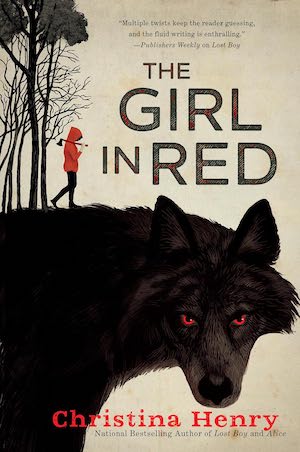
The Girl in Red is a retelling of “Little Red Riding Hood,” but Christina Henry massively expands her version beyond the borders of the original fairy tale by giving it a post-apocalyptic setting. A deadly airborne disease has rapidly spread through the population, but Cordelia—who goes by Red—has a plan to get to the safety of her grandmother’s house deep in the woods. The story is told via two timelines: one in the build-up to, and immediate aftermath of, the pandemic and one a few months later when the country is nearly deserted.
Red may only be 20 years old, but she has a few survival skills and a heck of a lot of determination (and she certainly won’t let her prosthetic leg hold her back!). I absolutely flew through this book and, if anything, I wish it were a little longer. I would happily have spent more time with Red as she treks through the woods, fights off dangerous fellow survivors, and witnesses the horrifying mutation of the disease.
The Road (2006) by Cormac McCarthy
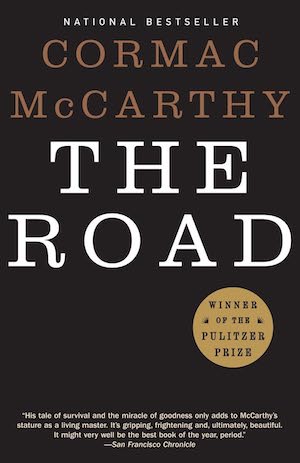
The Road is one of the most unrelentingly bleak post-apocalyptic books I’ve ever read. Told in pared-down but evocative prose, the story follows a man and his young son as they walk south to a (hopefully) warmer climate. What caused the end of the world isn’t revealed to the reader, but whatever it was left the US in a dire state: no plants grow, everything is covered in ash, and temperatures have plummeted.
The descriptions of the derelict world are haunting and the lives of the man and boy are unbearably hard. Along with being constantly hungry and cold, the pair also have to evade the few other starving survivors who are still hanging on—the vast majority of whom have been driven to inhumane acts of brutality. But for all of the story’s heart-shattering darkness, the relationship between the father and son is also a testament to the power of connection and love.
All That’s Left in the World (2022) by Erik J. Brown
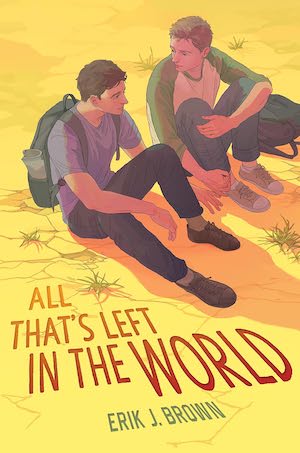
If constant stress, horror, and sadness isn’t what you’re after right now, then perhaps the heartfelt sweetness of YA novel All That’s Left in the World will be more your style. Don’t get me wrong, there are still moments of anxiety-inducing action as well as grief over what has been lost, but these elements are sprinkled throughout the narrative, rather than comprising the entire story.
Chapters alternate between the POV of two teenage boys, Jamie and Andrew. With a deadly flu having swept the world, Jamie is on his own at his family’s cabin in the woods of Pennsylvania. Andrew stumbles across the cabin while looking for supplies, and although the two are initially wary of each other (stranger danger goes into overdrive during the post-apocalypse, after all), they have an instant rapport that soon develops into a deeper connection.
The pair encounter plenty of stressful situations when they leave the cabin, but everything feels a little bit lighter than is typical of most post-apocalyptic stories. This is thanks in part to their budding romance, but it’s also down to the humorous through line provided by the easy banter between the pair.
I would love to know which post-apocalyptic books you would have picked for this list. Feel free to leave any suggestions in the comments below, even if they only partially fit the theme (sections of Stephen King’s The Stand, for instance, feature characters traveling across a deserted America)!

